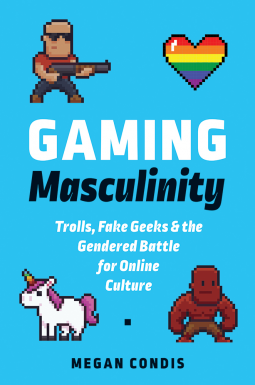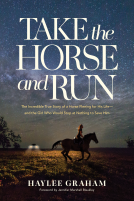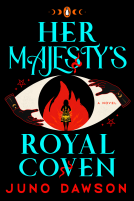
Gaming Masculinity
Trolls, Fake Geeks, and the Gendered Battle for Online Culture
by Megan Condis
This title was previously available on NetGalley and is now archived.
Send NetGalley books directly to your Kindle or Kindle app
1
To read on a Kindle or Kindle app, please add kindle@netgalley.com as an approved email address to receive files in your Amazon account. Click here for step-by-step instructions.
2
Also find your Kindle email address within your Amazon account, and enter it here.
Pub Date May 01 2018 | Archive Date May 01 2018
University of Iowa Press | Fandom & Culture
Talking about this book? Use #GamingMasculinity #NetGalley. More hashtag tips!
Description
In 2016, a female videogame programmer and a female journalist were harassed viciously by anonymous male online users in what became known as GamerGate. Male gamers threatened to rape and kill both women, and the news soon made international headlines, exposing the level of abuse that many women and minorities face when participating in the predominantly male online culture.
Gaming Masculinity explains how the term “gamer” has been constructed in the popular imagination by a core group of male online users in an attempt to shore up an embattled form of geeky masculinity. This latest form of toxicity comes at a moment of upheaval in gaming culture, as women, people of color, and LGBTQ individuals demand broader access and representation online. Paying close attention to the online practices of trolling and making memes, author Megan Condis demonstrates that, despite the supposedly disembodied nature of life online, performances of masculinity are still afforded privileged status in gamer culture. Even worse, she finds that these competing discourses are not just relegated to the gaming world but are creating rifts within the culture at large, as witnessed by the direct links between the GamerGate movement and the recent rise of the alt-right during the last presidential election.
Condis asks what this moment can teach us about the performative, collaborative, and sometimes combative ways that American culture enacts race, gender, and sexuality. She concludes by encouraging designers and those who work in the tech industry to think about how their work might have, purposefully or not, been developed in ways that are marked by gender.
Advance Praise
“Megan Condis addresses the most important and contentious controversies in gaming culture at present. Her writing argues strongly against the groups who have tried to undermine the diversity arising in games and provides a passionate insight into these events, linking them with wider cultural shifts in Western society.”—Esther MacCallum-Stewart, Staffordshire University
“Fierce, fun, and fascinating. Condis writes with a journalist’s ear and an academic’s eye, getting to the core of what drives men’s behavior online, in games, and throughout digital culture.”—Derek A. Burrill, author, Die Tryin’: Videogames, Masculinity, Culture
Available Editions
| EDITION | Paperback |
| ISBN | 9781609385651 |
| PRICE | $65.00 (USD) |
| PAGES | 160 |
Links
Average rating from 18 members
Featured Reviews
This book is quite enlightening to me; I do a tiny spot of gaming from time to time and come across antifeministic statements. Often, people are referred to as "gay", "girly", or "brah", with very different values attached.
This book serves as a quite sober and varied view at how gender is seen by persons online, trolls and non-trolls alike, if one can separate an audience into those two quarters.
From the starts, on what "bro's law" could be:
<blockquote>I propose a new Internet maxim that I will call Bro’s Law, a corollary to the famous Poe’s Law, which describes the inherent difficulty in separating out actual, sincere statements of extremist views from parodies of those same views. The original formulation of Poe’s Law states that “without a winking smiley or other blatant display of humor, it is utterly impossible to parody a Creationist in such a way that someone won’t mistake [it] for the genuine article” (Poe 2015). It was coined by Nathan Poe in a discussion about religion, and it highlights the difficulty of coming up with exag bro’s law 13 gerated versions of an already extreme discourse. In his discussion of Poe’s Law, Scott F. Aikin remarks, “The humor and point of these sorts of parody is to present religious bigotry and scientific illiteracy in a fashion that magnifies it and thereby highlights its vice. The question, though, is how magnified those parodies really are. Even the most casual websurfing yields similar, if not more shocking scientific illiteracy and religious bigotry” (2013, 303). In popular usage, Poe’s Law has been evoked to describe extreme political positions of all kinds, not just of religious origin (Aikin 2013, 302). Those who evoke Poe’s Law imply that a philosophical system is sufficiently ridiculous that the sincerely offered statements of belief offered by those within that system will appear to be a parody to those on the outside. At the same time, Poe’s Law suggests that it will be difficult for those within the belief system to tell whether a new entrant into the conversation is legitimately a believer or simply a troll posing as one.
Bro’s Law functions similarly. It states: Without a winking smiley or other blatant display of humor (and sometimes even with one), it is utterly impossible to parody the views about gender held by many in gaming culture in such a way that someone won’t mistake it for the genuine article. For example, Kaceytron’s larger-than-life performance of a fake geek girl persona is apparently mistaken by many to be the sincere performance of a woman intruding into the heretofore masculine space of online gaming culture. At the same time, it is difficult to tell which of the hateful, misogynist comments that accompany her donations are sincerely hateful and which are a kind of audience participation with her performance by fans who enjoy her schtick.</blockquote>
As such, it's quite interesting to see how gender issues have moved from real life into the Internet with the advent of the latter; attackers are prone to hide with their own crowd (e.g. 4chan) while using inflammatory language against everything which is what they are not.
Condis does a good job at analysing why that is, and why trolls hide together, afraid of becoming outcasts themselves:
<blockquote>This set of discursive rules makes it difficult for in-group members to articulate, or even conceptualize, dissention. According to trolling logic, membership in the community means that (and is measured by the fact that) one has the same unemotional masculine-coded reaction to provoking and sexist statements as everyone else. There is little space for disagreement over the codes that govern group membership because group membership only becomes visible through conformity to those codes.</blockquote>
As attacking somebody online often spans from one's own insecurities and fears:
<blockquote>The roots of Internet culture, which are steeped in what T. L. Taylor (2012) calls geek masculinity, suggest that the game of trolling developed as a way for those male subjects who found themselves locked out of the privileges associated with successful performances of traditional masculinity in the physical world (because of their failure to achieve certain masculine markers such as bodily strength and athleticism) to (re)claim a new kind of manhood.</blockquote>
The book contains a lot of factual pointers on how companies, even ones such as Microsoft, have normalised a vulgar and unacceptable view of sexual violence:
<blockquote>Microsoft later apologized for the “off the cuff and inappropriate comment” (Greenfield 2013) that was meant to be “friendly gameplay banter” and not “bullying and harassment of any kind” (Ngak 2013). However, the fact that a phrase so commonly associated with rape might be thought of by industry professionals as “friendly banter,” that a presenter at “gaming’s biggest trade show in North America” (Takahashi 2016) would see no problem with directing such a phrase toward a female opponent, and that many in the audience would consider this the laugh line of the presentation point to the normalization of rape discourse in gaming culture.</blockquote>
Instances where certain women have been attacked due to simply highlighting sexism within the gaming world, e.g. Anita Sarkeesian and Kathy Sierra, are brought up and analysed, displaying how the attacks happened. It's exactly like reading a step-by-step play of well-known terrorist operations, although this happens far more often, and affects non-white males, simply because the victims are non-white males.
Some paragraphs are very well written:
<blockquote>It is tempting to imagine the geeky world of online gaming as an equalopportunity environment, one where women and men exist on an equal playing field. We want to believe that on the Internet, where physical bodies are unimportant in comparison to textual and technical performances, anyone can rise to the top of the social hierarchy, regardless of gender. However, participants are only able to do so when they use the anonymity provided by the Internet to construct a persona in keeping with the new (male) geek chic. Girls can play alongside the boys, but only insofar as they can make themselves seem to be like one of the boys. Queer people are welcome only so long as they work to avoid being seen as fags (see Chapter 4). Ironically, it requires a great deal of labor from both male and female participants in gaming culture to maintain a posture of effortless self-possession. Trolling is a game of aloofness and uncaring that actually requires a great deal of commitment to play.</blockquote>
All in all, there are hopeful parts in this book that state how changes are actually happening in the world of gaming. It would have been great to see the inclusion of analysis post #metoo. I'd love to have seen a bit more editing to make the book not feel as fragmented as it is, but as a whole, this book is very needed, and a necessity for people to understand t
 Tahlia D, Reviewer
Tahlia D, Reviewer
A wonderful insight into the aggressive macho culture of gaming.
If you're a girl (or even just a minority) who has played online games, you will no doubt have experienced some of the situations outlined in this book - guys calling you a "fake gamer" and undermining your abilities and essentially hindering your game experience.
The author talks about how the dominant culture in gaming is the straight white middle-class privileged male, and if you don't conform to these standards, prepare to be ambushed.
A must read for every girl or minority gamer who can't stand this gross game culture.
I would have 5-starred this if the author devised a plan for how the industry can combat this or even make it better - is there a way?
 nathan h, Reviewer
nathan h, Reviewer
A relatively short read with a considerable amount of thought-provoking material.
Condis has here a great collection of thoughts regarding the lack of a proper level "playing field", as it were, for women (and the LBGT community) in video games, reasons as to why that is, and suggestions on how to improve.
Having read this immediately after a book on race relations and how to become (and remain) more sensitive to those issues, what Condis is writing on and bringing to light isn't crazy talk---women play games, and they should be able to access these worlds just as fearlessly as the established "default" players (straight white males) do.
While the sections on the types of females found in the gaming world, along with the establishment of why the status-quo in the gaming world cries out for blood when others wish for a "seat at the table" are worth your time, the real jewel in here is the section on GamerGate and its ties to both the AltRight, as well as the Trump presidency. That chapter's not to be missed. I'm better for reading it, and I'll be dwelling on Megan's words on that subject for a long time coming.
I do have one issue with the book I'd like to bring up, and that's the usage of 2 female characters in film to bolster/support a point to where females are either conquered and domesticated or simply used without regard: The two films used had their respective female characters presented in one particular fashion/dimension that, to me, displays a misunderstanding of the scene, the character, or both. As much as I agree with Condis about her overall argument, I think her choices here undermine and weaken what she's trying to accomplish. Pop culture has some better examples of female characters that are superior choices.
Condis does her best to keep this out of the weeds in terms of gaming terminology, so you shouldn't be too confused if you're not keeping up with the hot new terms.
Many thanks to NetGalley for the advance read.
 Hillary J, Librarian
Hillary J, Librarian
As a female gamer, a lot of the material in this book resonated with me in being accurate to my experience. Both in dealing with male trolls on the internet and in dealing with women who play the "dumb" role online to further their own ends.
This book discusses the problems with the gaming culture as it relates to its acceptance of certain types of masculinity, most notably, how it embraces and endorses toxic masculinity. Even to the point of making male gamers who do not participate in this culture, complicit by proxy, or limiting the play of so called "inferior" males who refuse to engage in the trolling.
There have been many books on this subject lately, but, we cannot address the problem simply by writing about it. Hopefully, this book can join the others in finally fixing the problem of these insular, toxic spaces.
 Tiffany T, Educator
Tiffany T, Educator
Insightful, and thoroughly researched. Condis has written a great read about gendered internet culture, and it easily kept my attention. I enjoy video gaming and have experienced much of what she discusses throughout the book. I do feel that many of the topics could have been expanded upon, but I realize there is only so much that someone can include in a short work. The expansive abuse from both gamers and even the compliance of video game creators was nothing new for me, and I am glad that academia is starting to look beyond dating and social media to explore the numerous ways women, transgenders, and the LGBTQ community are bombarded with negativity. For gender studies and pop culture work, I would recommend this book to many people. In fact, I already have!
 Kimberly O, Educator
Kimberly O, Educator
Gaming Masculinity is a short book, but not necessarily an easy book. It is definitely an important look at how pervasive toxic masculinity is in online games. It was equal parts rage inducing and distressing to read example after example of horrid behavior from both participants and creators of popular online games.
I think this book will resonate with anyone who is tagged as "other" by the online gaming community (i.e. anyone who is not a heterosexual white male). I particularly liked the Game Break sections, where Megan Condis analyzed a specific, popular game - It gave me a lot of insight into a world I am only casually familiar with.
I would recommend this book to anyone who enjoys online gaming - it will give you well-researched and thought out insights into this increasingly popular subculture.
 Kirstin V, Bookseller
Kirstin V, Bookseller
What I was expecting was a sort of cutesy novelty book about what it’s like being a female in the nerdy community, but what I got was a whole lot more honesty than that! Gaming Masculinity did an amazing job of highlighting the toxic masculinity within the gaming subculture, as well as shining a light on the erasure of entire populations of gamers. The sad truth is that the anonymity of gaming gives freedom to a lot of hate speech such as calling negative things “gay,” or calling people out on their skin colour, sex, gender, pronoun preferences, sexuality, etc. and this book was equal parts enlightening, empowering, but also highly frustrating. I would definitely suggest it to anyone who identifies as a gamer!
 Educator 401793
Educator 401793
Fabulous. As a "gamer girl" I felt this book was honest and well executed in it's discussion of the gender dynamics within the gaming community.
The toxic masculinity and performance aspects of being part of this culture are difficult to explain but the author does this so well.
My one reason for not giving five stars comes from me reviewing as a high school teacher-librarian, I think this text could belong in college anthropology or sociology courses (maybe even psychology courses), but less so at high school. As an adult reader, I would give five stars!
 Media/Journalist 149037
Media/Journalist 149037
As Condis reminds us in her book, the early adopter of internet technology had envisioned the web as an equal opportunity environment. According to them, we’d soon leave our bodies, our prejudices behind and embodiment as a marker of identity would entirely fade away.
Alas, these utopian dreams have not yet come to pass and discrimination based on gender, sexual orientation and race is still rife in the digital landscape. This is particularly true in the virtual world of gaming. Too many gamers still believe that you can’t be a real gamer if you’re not a straight white man. Today however, more and more women are making their way into the gaming culture. The female “invasion” of the gaming space (as well as the presence of anyone deviating from the caucasian heterosexual standard) threatens their privileges and identity. Gamers retort by professing their disdain for anything considered feminine or gay. This makes for a highly toxic environment where overt sexual objectification of women is regarded as a ‘normal part of the culture’, where homophobic epithets are thrown at one another and where rape is used as a metaphor for dominance in the game.
The book Gaming Masculinity examines how gender politics are filtered through and produced by the logic of video games, in both expected and unexpected ways. It explores how gamers are trolling and segregating anyone who doesn’t conform to their idea of what a gamer should be but it also reveals how female and queer gamers are fighting back to obtain a space and a legitimacy in gaming, how they create countermemes that decry sexism in geek culture, how they hack into their favourite online role-playing games to include gay and lesbian relationships and how they turn on its head the assumption that video games can only be profitable if they appeal exclusively to straight white guys.
The discussion around gender and sexual preferences in gaming is an important one not just because gaming is a growing industry but also because the logic of gaming is seeping into other arenas: politics, online dating, education, interaction, activism, etc. In the last chapter of her book, Condis draws parallels between the toxic masculinity of gamer culture and the politics of the alt-right. She explains how #GamerGate taught the Trump, the Milo Yiannopoulos, the populists and the far-right advocates of this world how to troll, hack the political game and muddy the waters when mainstream media accused them of racism and sexism.
The book is also a call to developers to design more inclusive contents and safer environments for women, queer, people of colour, disabled people or other unacknowledged groups.
I’m not a gamer and, like most of you, i know male gamers who are neither sexist nor homophobic. Yet, i found this book fascinating because of the way it transcends gaming and virtual world and shows us the impact that online behaviour can have on ‘real’ life (and vice-versa, of course.)
Gaming Masculinity is a very dense book. It is packed with case studies, observations and reflections but it also suggests paths to undertake if we want improve gaming culture. It’s also very entertaining. I highly recommend you get your hands on a copy!
Related book review: Algorithms of Oppression. How Search Engines Reinforce Racism.
 Ashley H, Librarian
Ashley H, Librarian
I picked up this book more out of personal interest than consideration for my patrons. I'm a gamer, and my partner is a video game journalist. I also focused on feminist theory in my first graduate degree. That said, I will absolutely be making this book available to patrons, as it very thoroughly breaks down the prevalence and presence of toxic masculinity in the gaming subculture.
 Janice B, Reviewer
Janice B, Reviewer
This is a well-written and seemingly well-researched look into the world of online gaming. I must admit that I am not a gamer and was therefore pretty naive as to the culture. The phrase “toxic masculinity “comes up as the prevailing atmosphere. It is a world of straight, often white, male bias where players who fall outside of those pretty limiting boundaries are often disparaged, bullied and in general disrespected. Pretty discouraging all in all. However the first step towards change is to shine light on the problem areas. The author represents a thoughtful and insightful movement towards changing that culture. The book is an excellent step forward and is a thought-provoking and quality read. Recommended.
My thanks to NetGalley for providing me with an arc in exchange for my honest review.
Readers who liked this book also liked:
Yuzuru Kuki
Biographies & Memoirs, Children's Nonfiction, Comics, Graphic Novels, Manga
We Are Bookish
LGBTQIAP+, Romance, Sci Fi & Fantasy













